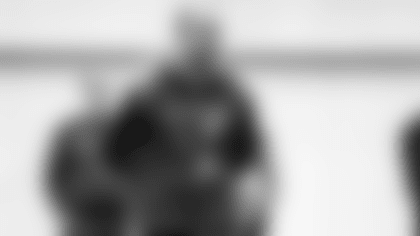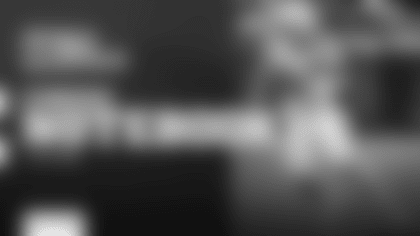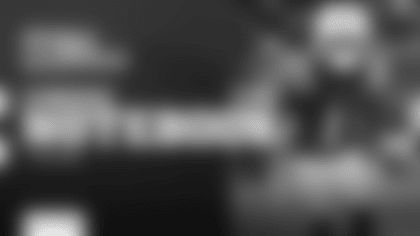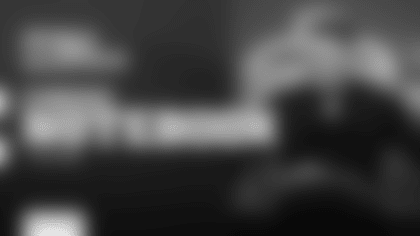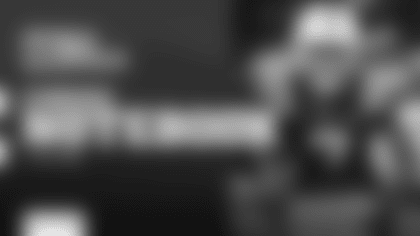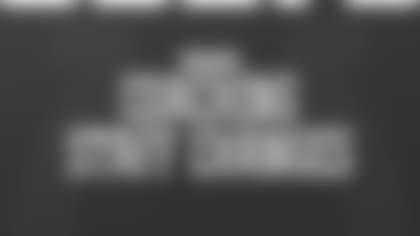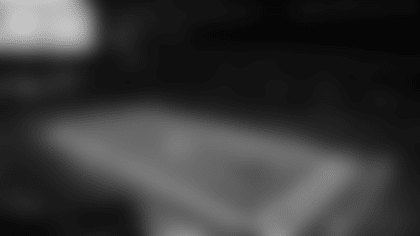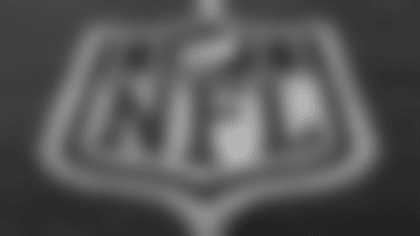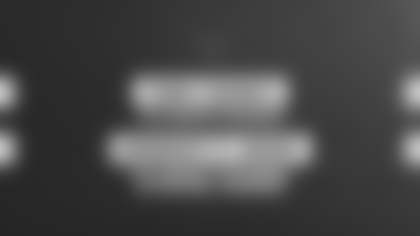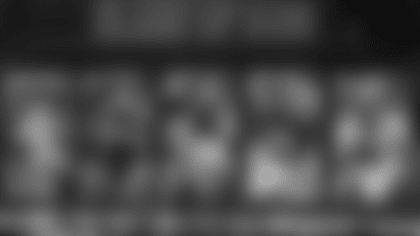INDIANAPOLIS —Cleaning up the "what's a catch?" controversy, determining reviewable plays and drastically changing the pass interference penalty are the more major among several playing rules being voted upon at next week's annual league meetings in Orlando.
The National Football League this week released a list of the 2018 playing rules proposals, some of which were submitted by various teams, while the rest were submitted by the league's competition committee.
In all, the league owners will vote on 10 playing rules proposals, as well as 12 bylaw proposals and five resolution proposals.
Here's a summary of the playing rules proposals you'll be hearing about next week in Florida:
Submitted by:Competition Committee
Rule proposal:Makes permanent the playing rule that changes the spot of the next snap after a touchback resulting from a free kick to the 25-yard line
Relevant details:A couple seasons back, the owners approved a temporary change in the touchback rules, in which touchbacks on kickoffs resulted in the receiving team starting its drive at the 25-yard line, as opposed to the 20-yard line. This rule, being submitted for player safety, makes that temporary change permanent.
—————————Submitted by:Competition Committee* *
Rule proposal:Changes standard for a catch
Relevant details:This one's a biggie. If you've been even somewhat following the NFL in recent years, you'll know there's been a running controversy about what exactly constitutes a catch. This really started to take off about eight years back when Detriot Lions receiver Calvin Johnson had a touchdown taken away after he didn't "survive the ground" against the Chicago Bears; then, in the 2014 playoffs, Dallas Cowboys receiver Dez Bryant appeared to make a terrific game-changing catch against the Green Bay Packers, but after a replay, the officials ruled it an incomplete pass because the ball was jarred loose when he hit the ground, and the Cowboys lost.
The actual proposed changes to the rule are pretty wordy, so we'll try to simplify it for you: the competition committee basically wants to eliminate the "survive the ground" requirement for a catch; the ball slightly moving after hitting the ground would no longer necessarily make for a ruling of incomplete pass. If a catch looks like a catch, especially upon replay, then the officials should be able to rule it that way. If a receiver has control of the ball, two feet down (or another body part) and makes a football move (a third step; reaching or extending for the line-to-gain; or the ability to perform such an act) then it's a catch. Got it?
—————————Submitted by:Competition Committee
Rule proposal:Makes the penalties for Illegal Batting & Kicking the same
Relevant details:An illegal bat is when a player bats or punches a loose ball towards his opponent's goal line; if it has touched the ground and it's in either end zone; or an offensive player bats a backward pass in flight towards his opponent's goal line. Also, no player may deliberately kick a loose ball or a ball that is in a player's possession. The competition committee, for the sake of officiating consistency, wants both of these infractions to result in a 10-yard penalty.
—————————Submitted by:Los Angeles Chargers
Rule proposal:Adds fouls for roughing the passer and fouls against players in a defenseless posture as reviewable plays in the instant replay system
Relevant details:Current plays covered by the NFL's replay system include: plays involving possession and/or the touching of either the ball or the ground; plays governed by the goal line, boundary lines, line of scrimmage and the line to gain; number of players on the field at the snap, even when a foul is not called; and game administration, like penalty enforcement, proper down, spot of a foul or status of the game clock.
Simply put, the Chargers would like to add roughing the passer calls and fouls against players in a defenseless posture to that list. The NFL has been really focused on speeding the game up, however, so while it'd be nice to have these added to that replay list — they can oftentimes be very critical calls throughout the course of a game — one might imagine that whole timing aspect could come into play here.
—————————Submitted by:Washington Redskins
Rule proposal:Add review of personal fouls as reviewable plays in the instant replay system
Relevant details:Same idea as the Chargers' proposal, only the Redskins want to make all personal foul penalties subject to instant replay review in order to correct any possible officiating errors. But, just like the Chargers' proposal, it might be hard to convince the league's owners to add to an already-long list of reviewable plays when the NFL has been working diligently on speeding up the game.
—————————Submitted by:New York Jets
Rule proposal:Change the enforcement for defensive pass interference
Relevant details:If the Jets had their way, the defensive pass interference rule would be enforced much more like the college game, in which that penalty is capped at 15 yards, versus the current NFL rule, in which the ball is placed at the spot of the foul and the offense is awarded an automatic first down. The Jets' proposal, however, also gives officials to still make it a spot foul if the interference is determined to be "intentional and egregious."
This is a tough one. Currently, some may believe that NFL wide receivers have an advantage over those covering them due to the way interference has been called for the last few years. But this proposal would also introduce another area in which an official's judgement is put into play, which leads to all kinds of possible controversies. It also could open the door to a much more aggressive style of play by defensive backs and linebackers who are willing to toe the line on the "intentional and egregious" caveat on deep plays down the field.
—————————Submitted by:Competition Committee
Rule proposal:Authorizes the designated member of the Officiating department to instruct on-field game officials to disqualify a player for a flagrant non-football act when a foul for that act is called on the field
Relevant details:This one is interesting. So essentially, the replay official in the league's review center in New York could, if passed, tell the officials at the game to eject a player if they believe a player has done something egregious enough to merit it. Oftentimes, the officials at the game are so caught up in everything going on around them that they understandably might not immediately comprehend the magnitude of a certain outrageous act during or after a play, and, as we've seen before, they'll just issue a personal foul penalty to the offending player, when it's pretty obvious they need to be kicked out of the contest. Keep an eye on this one.
—————————Submitted by:Competition Committee
Rule proposal:Conforms the amount of time in which a team must challenge a play if there is a television commercial break following the play in question
Relevant details:So, here's what would be different if this was passed: "If there is a television break prior to the next legal snap or kick, a 40-second play clock will start at the Game Official's signal indicating a television timeout, and the Head Coach will have until the expiration of the 40-second play clock to throw his challenge flag." This is a pace of play-based proposal, and might make it a little more fair for everybody if a coach has the same general amount of time to challenge a play, instead of taking advantage of the extra time afforded by a TV timeout.
—————————Submitted by:Competition Committee
Rule proposal:Eliminates the requirement that a team who scores a winning touchdown at the end of regulation of a game to kick the extra point or go for two-point conversion
Relevant details:Pretty self-explanatory. If a game is already won, there's really no point in attempting a point-after-touchdown. However, there are some possible implications to this that are out of the league's control, such as point spreads, that might create furor if and when these scenarios present themselves.
—————————Submitted by:Competition Committee
Rule proposal:If there is a turnover, a team may win an overtime game, even though it scores on its second possession
Relevant details:This one can get a little wordy, but basically, if the team that possesses the ball first during overtime scores a field goal on its initial possession, the other team (the second team) must have the opportunity to get possession of the ball. What's already in the rules:
• If the second team scores a touchdown on its possession, then it is the winner; and
• If the second team scores a field goal on its possession, the team that scores next by any method wins the game.
What the competition committee wants to add to those qualifiers is:
• "If the second team does not score on its possession, the game is over, and the first team is the winner" subject to…
• "If the second team loses possession by an interception or fumble, the down will be permitted to run to its conclusion, and all rules of the game will be enforced as customary, including awarding points scored by either team during the down. If the second team scores a touchdown on the down after re-gaining possession, it is the winner. Only fouls that require the down to be replayed, fouls that negate a score, or palpably unfair acts will be enforced."




